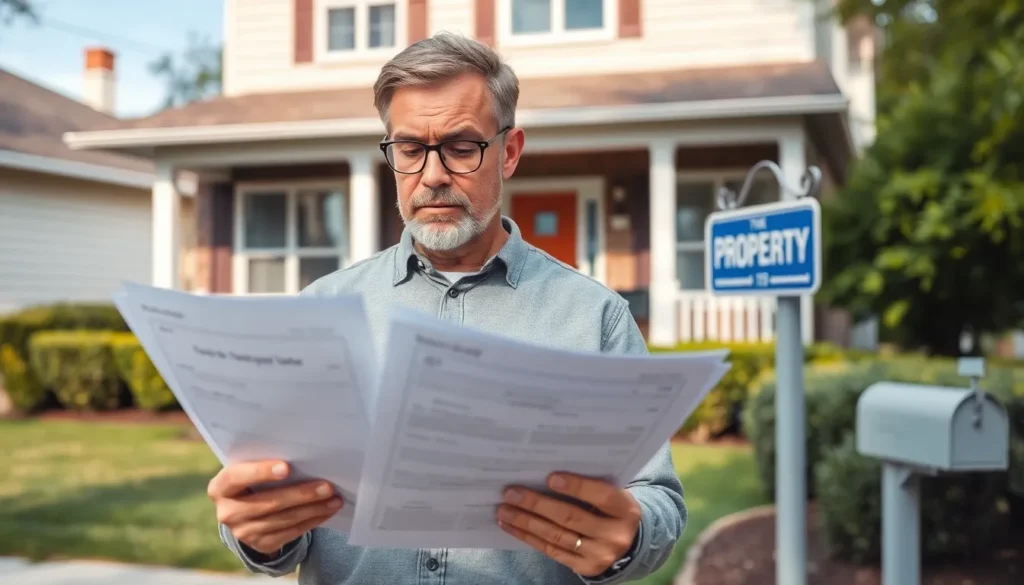Table of Contents
ToggleRenting a house can feel like a wild adventure, and not just because of the questionable wallpaper choices. Whether you’re escaping the parental nest or seeking a cozy nook in a bustling city, the rental market offers a treasure trove of options. But before diving headfirst into that charming abode with the questionable plumbing, it’s crucial to navigate the ins and outs of house hunting with a smart strategy.
Overview of Renting a House
Renting a house involves several important considerations. Many renters look for properties that cater to their needs within a specific budget. Potential tenants often examine the location, amenities, and nearby services when making decisions.
Exploring various neighborhoods can uncover hidden gems that offer both comfort and convenience. Accessibility to schools, shopping centers, and public transportation ranks high on most renters’ priorities. They usually prefer houses that minimize commute times and increase overall quality of life.
Cost remains a significant factor. Rental prices commonly vary based on location, house size, and market conditions. Individuals interested in renting often compare similar properties to gauge fair pricing and value for money.
Landlords might require specific documentation, such as proof of income and references. They generally seek reliable tenants who can fulfill lease obligations. Thoroughly reviewing the lease agreement is crucial, as it outlines the terms and responsibilities of both parties.
Inspecting the property before signing any agreement plays a vital role. Renters should carefully assess features like plumbing, electrical systems, and unwanted pests. Identifying potential issues upfront can prevent disputes later.
Ultimately, renting a house requires careful planning and research. Prospective tenants achieve a smoother experience by staying informed about their options and knowing what to expect. Engaging with real estate professionals can provide valuable insights and guidance throughout the process.
Benefits of Renting a House

Renting a house offers several advantages that cater to a variety of needs. From flexibility to cost-effectiveness, these benefits can significantly enhance the renting experience.
Flexibility in Location
Flexibility ranks as a primary benefit when it comes to renting. Individuals can select locations that suit their lifestyles and job requirements without the long-term commitment of buying. Renting facilitates easier relocation for job transfers or lifestyle changes, providing options near urban centers or quieter suburbs. Many renters explore diverse neighborhoods, allowing them to discover what suits them best. Finding a rental property near essential services like schools or shopping centers enhances daily convenience. Such adaptability is particularly beneficial for those entering new job markets or seeking to experience different environments.
Lower Upfront Costs
Lower upfront costs serve as another significant advantage of renting a house. Compared to purchasing a home, renters face reduced financial barriers. Typically, initial expenses include a security deposit and first month’s rent, which can range from $1,000 to $2,500 depending on location and property size. In contrast, buying a home often requires a sizeable down payment and additional closing costs. This affordability allows renters to allocate funds toward savings or additional experiences. Furthermore, renters avoid costs associated with maintenance, property taxes, and homeowner’s insurance. Such financial flexibility can lead to better budgeting and investment opportunities.
Considerations Before Renting
Renting requires careful planning and attention to detail to avoid potential issues. Prioritizing key factors can lead to a more satisfying rental experience.
Budgeting for Rent
Budgeting remains crucial in the rental process. Determining maximum rent affordability protects individuals from financial strain. Rental prices vary significantly based on location, size, and market trends. Reviewing monthly income alongside expenses ensures a realistic financial plan. Including additional costs, like utilities and maintenance fees, gives a complete picture of overall expenses. Renters can compare similar properties using their budget to identify fair pricing. Allocating funds appropriately helps in maintaining a balanced budget while enjoying rent obligations.
Lease Agreement Terms
Examining lease agreement terms proves essential before signing. Understanding the duration of the lease and renewal options informs renters about their commitment. Key clauses, like pet policies and maintenance responsibilities, outline expectations. Renters should clarify terms regarding security deposits and late payment penalties. Reviewing termination conditions can prevent surprises later. Individuals benefit from asking questions about any unclear parts before agreeing to the lease. Engaging with a real estate professional may provide additional insights into standard practices and potential issues.
The Renting Process
Renting a house involves several critical steps that can make the experience smoother. Understanding these steps helps potential tenants navigate the process effectively.
Finding the Right Property
First, assess personal needs to narrow down property options. Consider factors like budget, location, and necessary amenities. For example, prioritizing proximity to schools or public transport can ease daily commutes. Evaluating the size and layout of properties ensures they meet lifestyle requirements. Explore listings online, attend open houses, and connect with local real estate agents for additional guidance. Comparing similar properties aids in identifying fair pricing and value. Researching neighborhoods provides insight into safety, community offerings, and future development plans. Conducting these evaluations helps renters find a suitable living arrangement that meets their expectations.
Application and Approval
Completing an application requires gathering essential documents. Potential tenants typically need proof of income, identification, and rental history details. Each of these elements plays a vital role in demonstrating financial stability. After submitting applications, landlords review them to assess suitability. Approval often depends on credit checks and background evaluations. Providing references can strengthen chances of acceptance significantly. Once approved, the next step involves reviewing and signing the lease agreement. Understanding lease terms clarifies responsibilities and expectations for both parties. Engaging with real estate professionals can help clarify any remaining questions during this stage, ensuring a transparent process.
Tips for a Successful Rental Experience
Effective communication with landlords plays a crucial role in a successful rental experience. Always be open and honest about any concerns or questions regarding the property. Landlords appreciate proactive tenants who seek clarity. Establishing a good rapport fosters a positive relationship, making it easier to address issues as they arise. Regular check-ins, especially during the initial settling-in period, help keep communication channels open. Addressing maintenance needs promptly in conversations shows responsibility and commitment.
Understanding maintenance responsibilities helps avoid misunderstandings later on. Lease agreements typically outline which party is accountable for various tasks. Tenants often handle minor repairs, such as changing light bulbs or unclogging drains. Major repairs, like plumbing issues or roof leaks, usually fall to landlords. Familiarizing oneself with these responsibilities ensures a smooth living experience. Documenting any maintenance issues as they occur provides clear records should further discussions be necessary. Engaging with landlords about who manages repairs fosters transparency and trust.
Renting a house can be a rewarding experience when approached with the right mindset and preparation. By understanding personal needs and financial limits renters can navigate the market more effectively. The importance of thorough research and communication with landlords cannot be overstated as these elements contribute significantly to a positive renting experience.
Being proactive about lease agreements and maintenance responsibilities helps avoid potential disputes down the line. With careful planning and an informed approach renters can enjoy the flexibility and financial advantages that come with renting a home. This journey can lead to a satisfying living situation that aligns well with individual lifestyles and goals.







